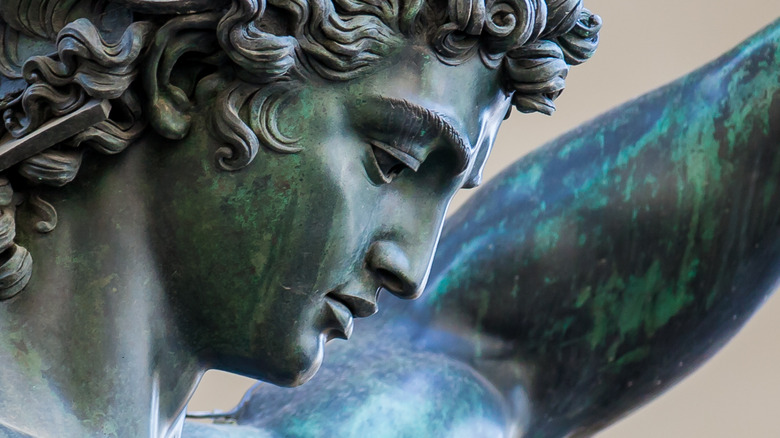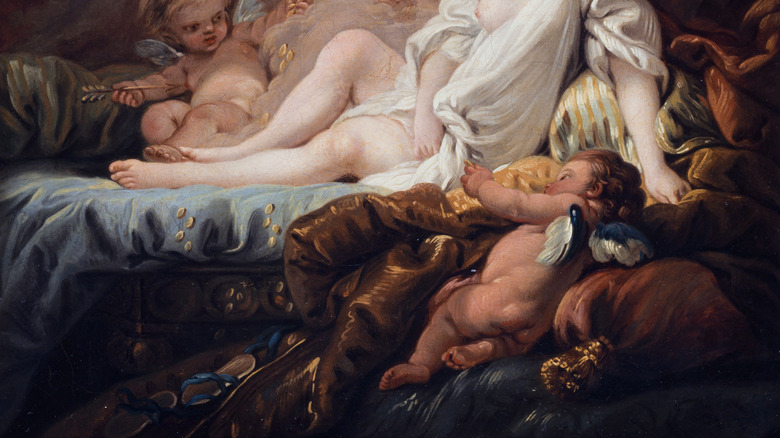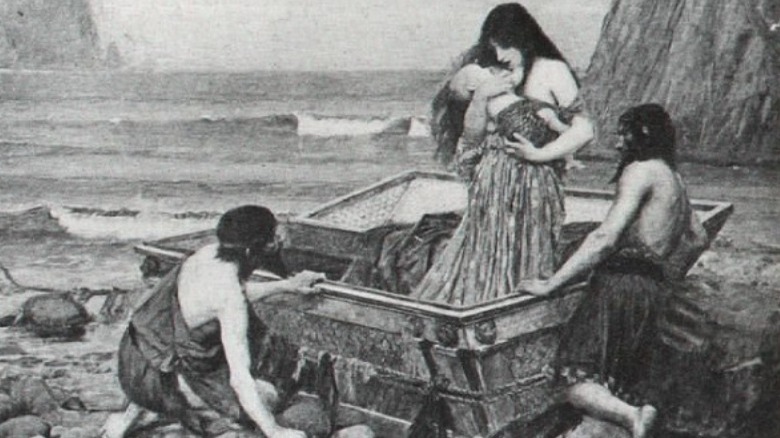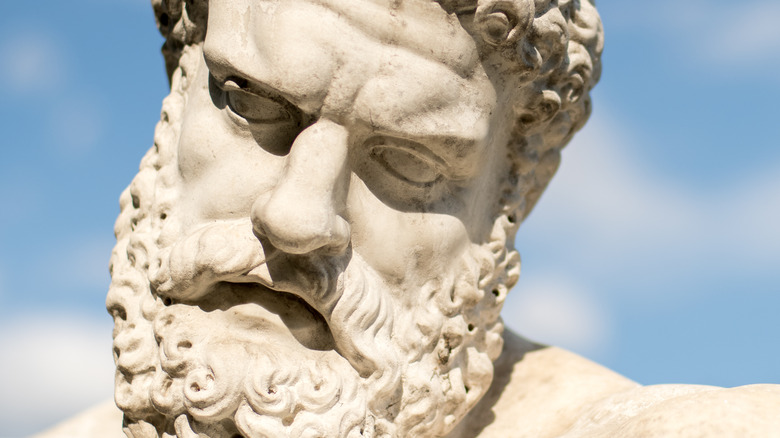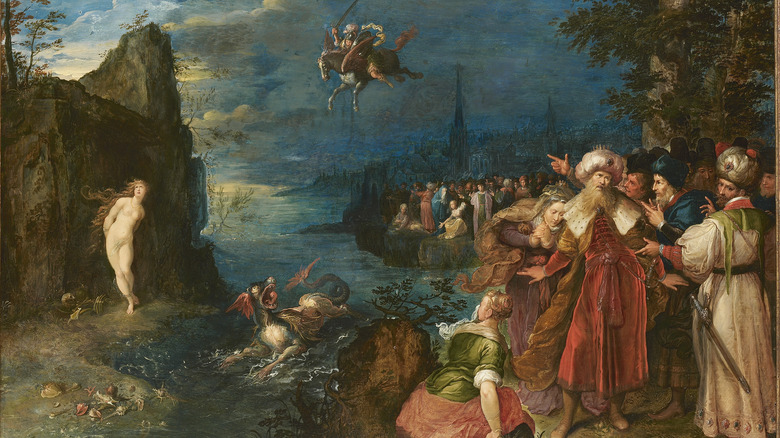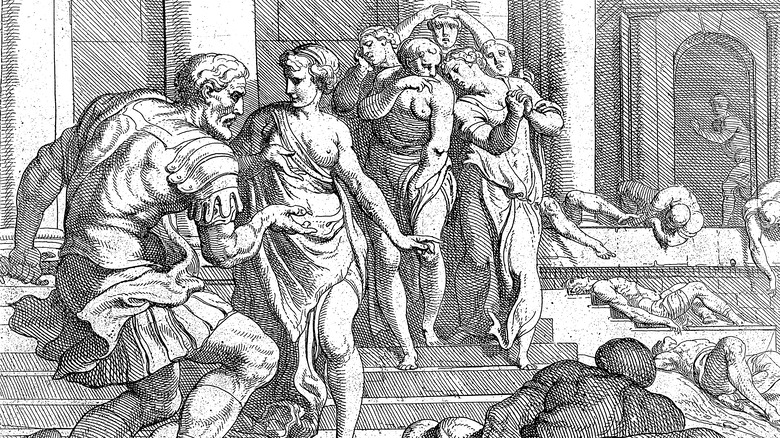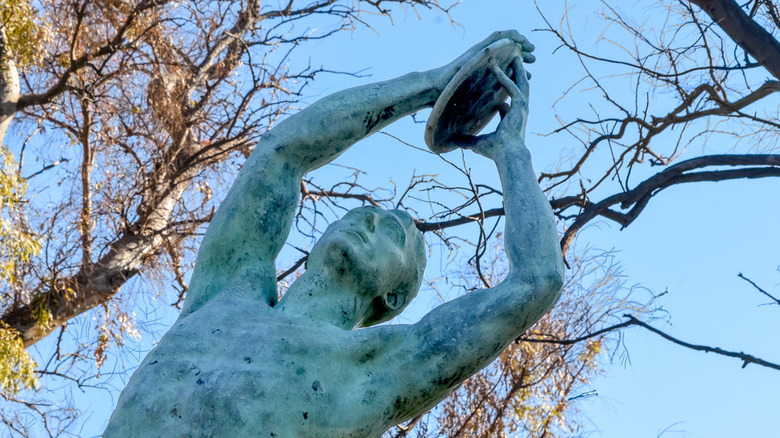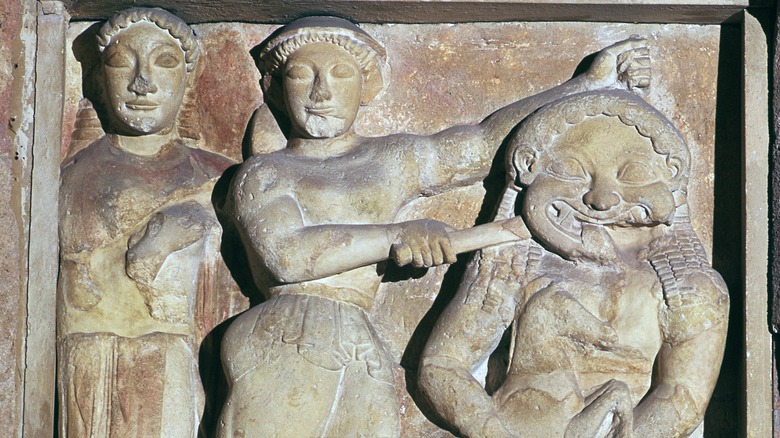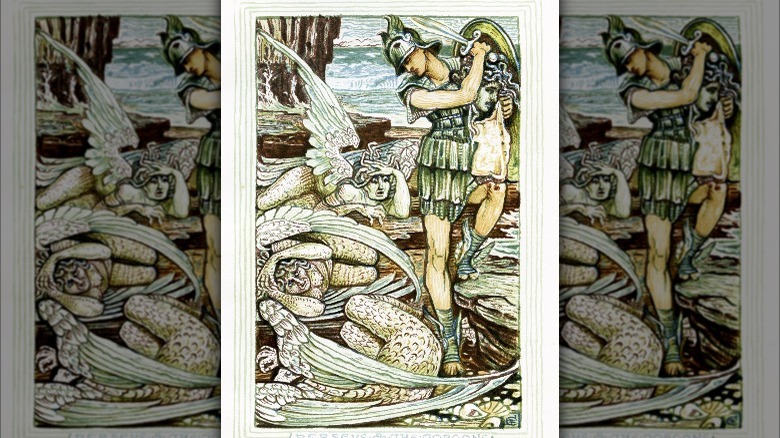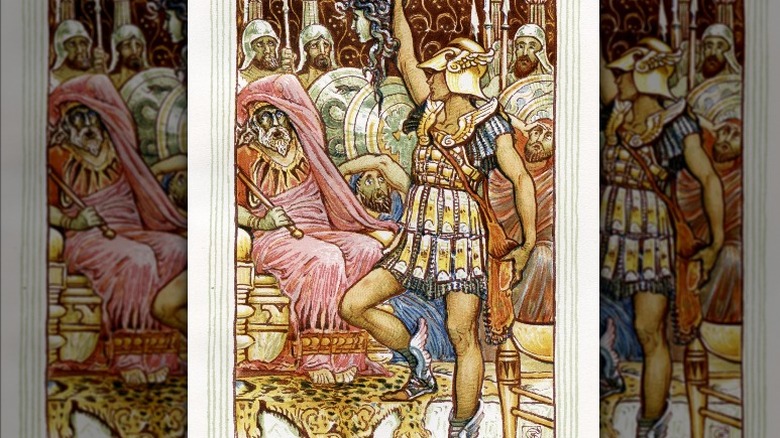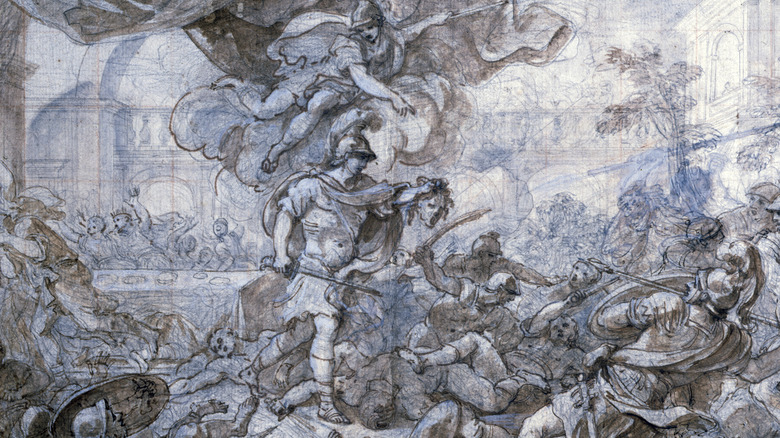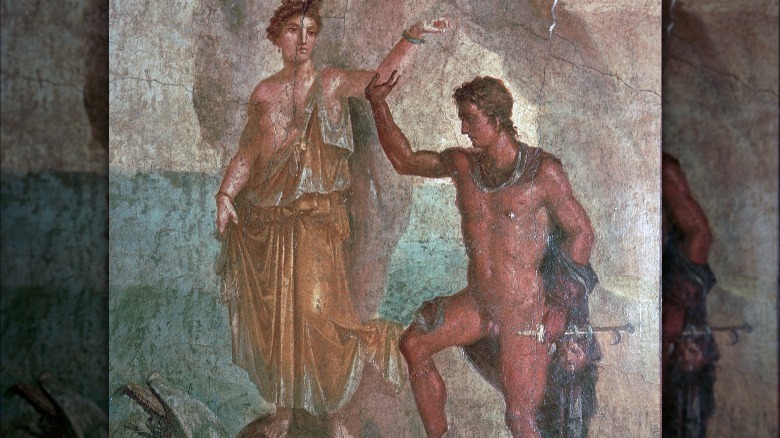Fascinating Facts About Perseus, The Greek Mythological Hero
There are many ancient Greek gods, heroes, and monsters that have become household names. There probably isn't a soul out there who at least doesn't recognize the name Zeus or Heracles (though the latter is likely better known by his Roman name, Hercules). Perseus can count himself among the lot of ancient Greek personalities whose name will at least ring a few bells.
As with many other heroes, he is most known for one big thing. Like Theseus, who is known for slaying the minotaur, and Bellerophon, who is known for riding Pegasus, Perseus is primarily known for slaying Medusa, the mortal Gorgon sister who could turn anyone to stone by simply looking at them. Which is terrifying, and had done away with many a good — and bad — ancient Greek denizen. But not Perseus: Immortalized in countless statues and paintings, Perseus is the one who holds aloft the head of the snake-haired woman in triumphant silhouette.
Nevertheless, Perseus did much more than that. And unlike heroes like Theseus, who have dubious reputations that involve some shady business, Perseus was almost entirely a positive presence in the ancient Greek landscape. So much so that he is something of an oddity. In a world of bitter and jealous gods where even the good mortals oftentimes got screwed over, Perseus managed to not only do good wherever he went, but kept on sound footing with the gods — which is a miracle in and of itself. Here's a look at some fascinating facts about Perseus.
His dad was a golden shower
Lineage is huge in Greek mythology. If you're descended of mere mortals, your lot in life is always a bit stunted. But thanks to some remarkably sex-craved gods, there were plenty of such people who boasted at least one immortal parent. For Perseus, his father — like so many others — was Zeus. Only not Zeus as you might know him. No, Zeus did not impregnate Perseus' mother by coming down to earth in his toga and flinging lightning bolts. Instead, he disguised himself as a golden shower. Which, to be clear, is exactly as it seems — a bunch of golden water drops. That was it. That's Perseus' father.
The story goes that Danae, Perseus' mother, had been locked up by her own father, Acrisius, according to the Theoi Project. He was the king of Argos, but a prophecy foretold that Danae's son would kill Acrisius. In order to prevent such a deadly grandson, Acrisius did what he thought to be the logical thing and kept her away from all men — only he greatly underestimated Zeus' sex drive.
Zeus has a long, long track record of disguising himself as things in order to impregnate mortal women. Some of his highlights include a swan, a satyr, and a bull — many of which he took the form of more than once, according to "Zeus Who?" But as gross and awful as Zeus is, maybe he deserves the smallest bit of credit for his creativity in becoming a literal stream of golden liquid.
He spent his infancy locked in a chest
Seeing as how Perseus' grandpa Acrisius locked up his own daughter (per the Theoi Project) in an attempt to keep her from getting pregnant, you can bet that he wasn't just going to let her give birth to the son that was prophesied to be his killer. If there is one thing everyone in ancient Greece should know — other than to avoid the gods whenever possible — it's never to take what the Oracle predicts for granted. The Oracle is always right.
Danae gave birth to a strong baby boy who looked perfectly capable of one day slaying his grandfather, and she managed to keep him secret for a few years. Still, being impossible to keep the child hidden forever, eventually Acrisius enacts Plan B, since his Plan A of keeping her in a cage failed so spectacularly. This time, rather than a cage, he locks both Danae and infant Perseus in a wooden chest, drills a few holes in the top, and casts them into the sea, according to "Danae and Perseus on Seriphos" (via the American Journal of Archeology).
The chest floated along the sea for quite some time before it was plucked out of the waters by a fisherman, who also just so happened to be the brother of King Polydectes. The king brought Danae and Perseus into his city and married Danae, who, at this point, probably just wanted to be left alone.
He is Heracles' great-grandfather
Perseus did some remarkable things. He slayed the mortal Gorgon sister Medusa, which no one else had been able to do (per the Theoi Project). He slayed a sea monster that Poseidon had sent himself and avoided any repercussions from the bitter, spiteful god of the sea (per the Theoi Project). He fell in love — actual love, not the Zeus kind of love that was so common in ancient Greek heroes — and even got on well with his wife's Ethiopian family.
But another pretty incredible thing Perseus did was to have a family that was remarkably successful — that didn't happen in ancient Greek mythology. After all, according to Mythology Source, the hero Jason had his children slain by Medea, and Theseus ditched Ariadne after she saved his life, just to name two.
But counted amongst the mass of descendants from Perseus that made an actual difference in legendary Greece, is one name that would surpass even Perseus in terms of heroics, and that name, of course, is Heracles, Perseus' great-grandson. Heracles is considered by many to be the greatest hero of ancient Greece, but his children went on to found over fifty Greek cities — and that all traces back to Perseus.
He killed an entire sea monster in the name of love
While every Greek hero has their crowning achievement, and Perseus' is undoubtedly Medusa, it's not his only one. Much like how Theseus also defeated the Marathon Bull (per the Theoi Project), Perseus also defeated an entire sea monster. And his motivation? True love. The short version of this story is that the mortal Ethiopian queen Cassiopeia claimed that her daughter Andromeda was more beautiful than the Nereids, who also happened to be Poseidon's daughters, according to the Theoi Project. Well, being a typically bitter and jealous Greek god, Poseidon didn't like this, and required Cassiopeia to offer her beautiful daughter as food to a sea monster — which Poseidon would send along presently.
Conveniently for Andromeda, at the same time the sea monster arrived, so too did her future husband, the mighty and strangely morally upright Perseus, fresh off of slaying Medusa. Seeing Andromeda, he immediately fell in love, pulled his ship over, and slayed the sea monster. How he did this is up for interpretation, according to "Perseus and Andromeda," by Kyle M. Phillips Jr., but he may have slayed it with a sword, or he may have just thrown rocks at it. Whatever the case, he did, in fact, slay the monster, and what better way to win over a soul mate?
Perseus and Andromeda sailed home together, they were married, and somehow Poseidon either never got wind of it — or something else upset him, and he forgot all about it.
He's the forefather of practically all of ancient Greece
Plenty of ancient Greek heroes did some cool things during their lifetime, had a few kids, and then faded away, leaving very little to longevity. But yet again, Perseus is an exception to this trend of one-and-done heroism. Not only did Perseus showcase pretty gnarly individual feats of dominance and found the city of Mycenae, but he is also the father of some pretty incredible children and grandchildren, all of whom went on to do their own great things and found their own great cities: All of it traces back to one man — Perseus.
One look at his family tree on Mythology Source will ring some bells for many people. There are names directly descended from Perseus that continued on that legacy of founding entire cities. Heracles, for example, is a great-grandson of Perseus (also a half-brother, because, you know ... Zeus), as is Perses, who is the founding leader of the entire Persian empire. Perseus' daughter, Autochthe, married Aegeus, the King of Athens and father of Theseus of minotaur fame. Perseus' other daughter, Gorgophone, gave birth to the King of Sparta, who would go on to marry Helen of Troy. Gorgophone was also the grandmother of Penelope, who married Odysseus.
The list goes on, but for those keeping track at home, that means that Heracles, Theseus, the Persian Empire, Sparta, Troy, and Odysseus (among others) all have Perseus to thank one way or another.
He accidentally killed his grandpa with a discus
Perseus' grandfather Acrisius went to great lengths to prevent Perseus from ever being born, per the Theoi Project. After the Oracle predicted that Acrisius would be killed by his grandson, he locked his daughter in a cage, only to be foiled by horny Zeus. He then locked his daughter and grandson in a wooden chest and set them adrift at sea, hoping that this would take care of things once and for all.
Acrisius knew the deal — don't underestimate the Oracles. They are never wrong. Though Acrisius clearly missed the plot because, let's say it again: they are never wrong. Meaning that no matter his efforts, it was inevitable that Acrisius was going to be killed by his grandson.
To be fair to Perseus, he and his mother Danae had gone on their way to live a new life. Perseus wasn't actively seeking his grandfather to slay him in accordance with the Oracle's prediction. In fact, it seemed like Perseus had moved on from that entirely. He had a beautiful wife, he was revered for his heroics, and he had a new city. But unfortunately for Acrisius, according to the Theoi Project, at the funeral of another king where both he and Perseus were in attendance, the mighty Perseus was tossing the discus with fellow funeral-goers: One throw got away from the mighty hero, mortally struck Acrisius in the head, and somewhere far away the Oracle probably cackled, because Acrisius was dead by his grandson's hand.
He had a working relationship with the gods
Among all the remarkable things Perseus managed to accomplish, from his individual heroics to his functioning family, he is also one of the few Greek heroes to not only see no deadly repercussions from the gods, but also somehow keep a really positive relationship with them. And perhaps the best example of this relationship, and how he maintained it, is seen in his quest to slay Medusa.
Naturally, this was never going to be an easy task, but Hermes and Athena came in to help. Hermes gave Perseus sandals with wings that allowed Perseus to fly, and Athena gave Perseus the cap of Hades, which made him invisible, according to Britannica. Naturally, both of these items were rather valuable to Perseus in his death-defying quest to slay a Gorgon, but once the quest was complete, he didn't abscond with the items and use them to other ends.
Once he had accomplished his task, he gave the items back to the gods and even went one step further, giving the head of Medusa to Athena, who put it on her shield. So not only did Perseus repay his loan, but he did so with interest. In doing so, Perseus demonstrated how not to anger the gods.
The battle with the Gorgons didn't end with the death of Medusa
You'd think that the hardest part of a quest to slay the mortal Gorgon sister Medusa would be actually slaying Medusa. But that, for Perseus, was arguably the easy part. He slipped in while she was asleep and cut her head off. Boom. Done.
You could say that the two valuable items he got from the gods — the Cap of Hades, which granted invisibility, and the winged sandals which allowed him to fly — were not even needed for the first part, according to "Perseus' Battle with the Gorgons" (via Transactions and Proceedings of the American Philological Association). After all, being invisible wouldn't stop you from turning to stone if you caught Medusa's eye.
It was what came next that was the hard part — escaping from Stheno and Euryale, the Gorgon sisters that were immortal. Naturally, they didn't take kindly to their sister being slain, and they got after Perseus, intent on making him pay. For Perseus, though, their fiery vengeance may have been his saving grace. Rather than simply turn him to stone with a stare, the immortal sisters wanted to catch him and tear him apart. Sadly for them, Perseus utilized those handy items from the gods and managed to escape their wrath.
He actually had a conscience
Perseus was unique enough as is, but as it turns out, he was actually a rare Greek macho man who had a functioning conscience fully equipped with feelings of guilt. Sure he slayed Medusa, but his only reason for doing so was because he was ordered to by King Polydectes.
Then there's the unfortunate incident of accidentally killing his grandfather Acrisius, the king of Argos, with a stray discus. More than a few Greek heroes — or indeed anyone — would probably have been pretty pleased with finding themselves the King of Argos. But not our friendly hero Perseus, though he was technically next in line for the throne, being Acrisius' grandson. He didn't, however. He was so wracked with guilt that he simply could not rule where once his grandfather ruled. Never mind the fact that his grandfather had tried to kill him when he was a boy. Instead, according to ThoughtCo., Perseus went to a neighboring city, Tiryns, which was far less developed than the flourishing kingdom of Argos, and traded kingdoms. Megapenthes, the ruler of Tiryns, was happy to downgrade Perseus in favor of stepping up himself.
Of course, Perseus would go on to move the capital to the brand new city of Mycenae, which would become one of the greatest cities in Greece, but it can never be said that Perseus got there by hook or by crook — he was one honest dude.
He used Medusa's decapitated head as a weapon
After Perseus decapitated Medusa, escaped the immortal sisters, and hopped his ship home, he had, in a bag, a very powerful object — the head of a Gorgon. While he did eventually give it to Athena once he got home, he first had some errands to accomplish with the head.
The first stop was Andromeda and the sea monster. Granted, this was an unplanned stop, but regardless, Perseus may well have used the Gorgon's head to turn the sea monster to stone. According to "Perseus and Andromeda" (via the American Journal of Archeology), it's unclear how he did the deed, only that he did it — but a literal petrification ray would be very tempting to use in these circumstances.
Even if he didn't, he did use it as soon as he got home. King Polydectes, who had fished baby Perseus and mother Danae out of the sea, was not a great guy. He had forced Danae to marry him and ordered Perseus to slay Medusa. Those were two no-nos for Perseus, and he brought it full circle by using the head of Medusa to turn Polydectes into stone, according to the Theoi Project.
He actually had a happily ever after
It seems nobody ever lives happily ever after in ancient Greek mythology. Either you die miserable from an unfulfilling life, or your success irks one god or another into smiting you for the rest of eternity. It simply always happened. After all, it's hard to succeed without stepping on a few heads to rise up, and when those heads are capable of sending sea monsters after you, the probability of an actual happily ever after is remarkably thin.
But Perseus did it, as Mythology Source can attest to. Despite having war waged on him by the immortal Gorgons and slaying Poseidon's sea monster, he avoided any repercussions. He always gave the gods back what they gave him, and when it came to his marriage, Perseus truly loved Andromeda: They had tons of children together, and they legitimately lived happily ever after, to the end of their days.
Of course, some of Perseus' children were rambunctious, and not all of them lived up to the high standards of their parents, but as for Perseus himself, he had a model life. He was a hero, a leader, and a family man — and he always repaid his debts.
